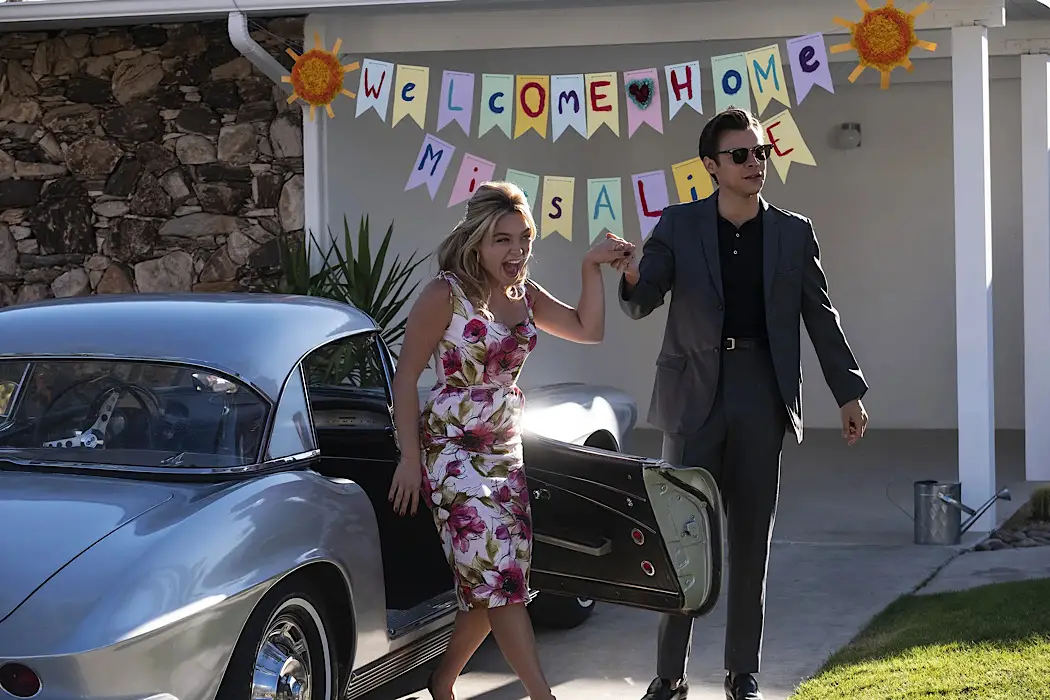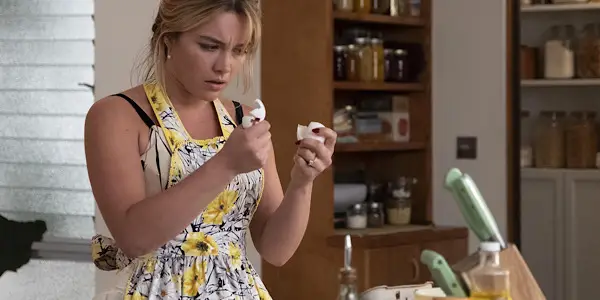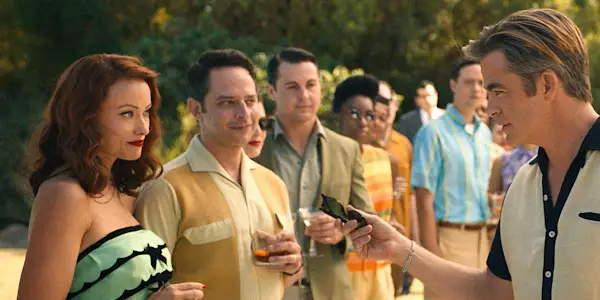DON’T WORRY DARLING: A Better Film Could’ve Been Found Within This Mystery

The promise of a good mystery doesn’t need to rely on a good twist. If a predictable plot is told with passion and a good structure, it can still obtain an emotional response from its audience. But setting up a mystery that doesn’t know how to be answered is a betrayal to the story being told, and to the people who are following it to its disappointing conclusion. Olivia Wilde‘s Don’t Worry Darling presents a rather fascinating setup but fails to deliver anything of consequence. What happens inside the walls of the Victory Project is bloody, uncomfortable, and a bit nonsensical.
The Leading Couple
Florence Pugh and Harry Styles play Alice and Jack Chambers, a happily married couple who live a dreamy suburban life, including all of your favorite retro tropes, such as shiny cars and songs which were released before there was any color in television. She cooks and cleans, while he drives off to the office, ready to come back when it is time for dinner. Everything seems to be running as smoothly as possible until Alice begins to notice things around town that don’t make quite a lot of sense.

The performances delivered by the two leads suffer from a big contrast in quality. Pugh gives everything she has to in one of the best performances of her career, while Styles visibly struggles to deliver his lines. It is this dissimilarity that makes the main relationship in the movie hard to take seriously. Pugh’s Alice grapples with questioning her reality and when she actively tries to find the truth, Styles’ Jack looks as if he might start crying, vomiting, or a combination of both.
Nevertheless, Pugh’s acting is not brought down by Styles‘ unfortunate performance. She shines as Alice, carrying the film with a very confident execution, ready to confront the horrors hiding behind the Victory Project’s stylish facade.
The Shallow Surface
Perhaps the biggest disappointment coming out of Don’t Worry Darling was the fact that the setting for it was memorable. Olivia Wilde’s dystopian suburb enchants with very colorful houses, bathed in fitting golden sunlight. A perpetual summer can be felt around the neighborhood and, since the inhabitants of the Victory Project strive to maintain perfect lives, everything must fall into a perfect and sparkling place. Matthew Libatique‘s cinematography is immersive, allowing the 50’s-inspired stage for the movie to consume the audience.
It is a major letdown how this mysterious paradise turns out to be a very shallow concept, providing unsatisfying answers to its most interesting questions. Wilde‘s sinister neighbourhood is not strongly constructed, and the reveal of its true intentions doesn’t feel earned. It seems as if fascinating ideas were brainstormed on a board, but they couldn’t be executed as the filmmakers intended. This psychological thriller teases the viewer with the promise of an intricate conspiracy but instead delivers a plot twist extremely less engaging than its setup.
And it is this bizarre way of putting the story together that ultimately brings the film down. While its ending might resolve Alice’s story in a disappointing way, the movie doesn’t hold up because the themes and elements introduced during the first act appear to have no correlation with those moved around during the final act. Seamlessly establishing the character motivations before exploring them throughout the runtime could’ve helped this film with its messy resolution.
A Suburban Journey with Alice Chambers
As previously stated, Florence Pugh‘s performance is this film’s redeeming quality. A great evolution in the character can be observed thanks to Pugh‘s talent. Her efforts in this project make you want Don’t Worry Darling to be a better movie, merely because it is bothersome to realize that such a graceful display of acting could belong in such a cluttered project.

Stepping into the shoes of Alice Chambers was a daunting challenge, given how the film could’ve used a little more polishing. After all, there is a lot of weight on this protagonist’s shoulders due to the world around her not being built on a solid foundation. It is in this instance where Pugh shines the brightest, bringing Chambers to life, and taking her through a paranoid journey in a quest to find the truth.
Pugh‘s brilliant efforts also demonstrate how lacking the rest of her character’s environment was. Besides Styles‘ work not matching her energy, the disorganized screenplay complicates the emotional resonance of her story. While her motivations and determination are powerful, the story ends before she can fully grasp the meaning of her misadventures. She goes from one set piece to the next without taking agency in her own narrative, until the movie ends in a point where a small epilogue might’ve done wonders overall.
Conclusion: Don’t Worry Darling
Don’t Worry Darling has some very good perks, such as Florence Pugh‘s performance as Alice Chambers, a shiny production design, and a setting filled with potential. Ultimately, the film tries to work with too many ideas without giving them one direction, creating a messy narrative that looks pretty on the outside but conflicting when carefully analyzed, similar to the Victoria Project.
Have you seen Don’t Worry Darling? How do you feel about it? Let us know in the comments below!
Don’t Worry Darling was released in theaters on September 23, 2022!
Watch Don’t Worry Darling
Does content like this matter to you?
Become a Member and support film journalism. Unlock access to all of Film Inquiry`s great articles. Join a community of like-minded readers who are passionate about cinema - get access to our private members Network, give back to independent filmmakers, and more.












